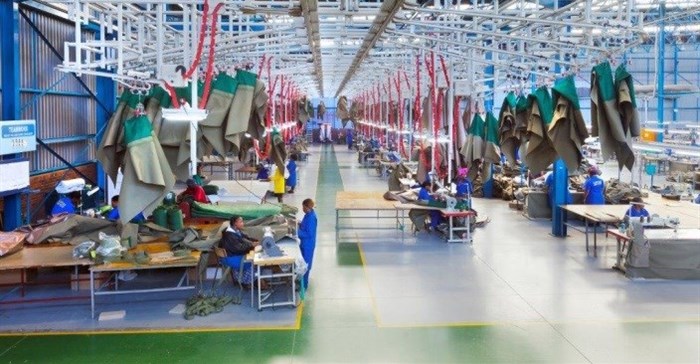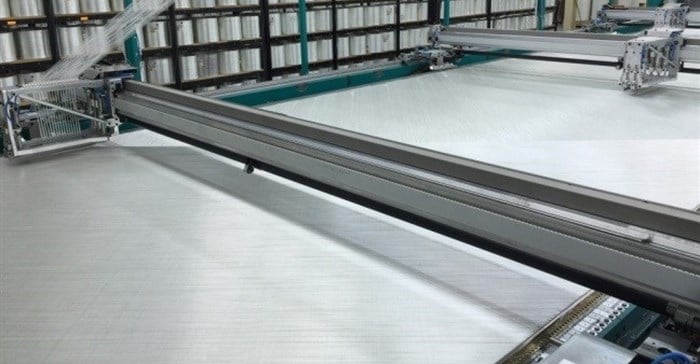At the beginning of the new millennium the South African textile and clothing sectors faced serious challenges. Following China's inclusion in the World Trade Organisation in 2001, local textile and clothing manufacturers suffered because of the cheaper imports of Chinese fabrics and finished products. Employment in the sectors slumped dramatically and more than 100,000 textile and clothing jobs were lost.

The ETON Material Handling System implemented at Canvas and Tent.
The government and the Department of Trade and Industry (DTI) stepped in to revive the industry with the introduction of the Clothing Textile Competitiveness Programme (CTCP), a programme managed by the IDC and the CTCP Desk, which was structured to drive competitiveness and increase productivity and employment opportunities in the South African textile and clothing sectors.
Realising the opportunity for growth under the DTI’s new CTCP programme, the South Africa Technical Textile Cluster (SATTC) was formed in 2011. The SATTC is a vertically integrated value chain cluster with an interlinked and innovative product offering, which is currently participating in the CTCP initiative. This market-driven public-private partnership cluster currently includes Gelvenor Consolidated Fabrics, Canvas and Tent, Stepahead Military Headwear Distributors, Fields Wear, Parachute Systems and Durban Overall, all of whom share a collective vision to become recognised global suppliers who set the standards for quality and innovation in the technical textiles sector and to make South Africa a preferred global supply source.
Ground-breaking technological developments
Over the last five years the SATTC has introduced a number of ground-breaking technological developments that have both increased productivity and product quality output. These developments include the installation of the Eton Material Handling System, a productivity improvement system, which was implemented by Canvas and Tent and yielded significant improved productivity results. Other technological advancements by SATTC include Gelvenor Consolidated Fabric’s investment in multi-axial machinery for energy-efficient fabric applications, which has created new product avenues, opened new international markets and has benefitted both Parachute Systems and Fields Wear in new innovative product applications.

The Multi-axial machinery for energy efficient fabric applications at Gelvenor Consolidated Fabrics.
These innovations and developments have resulted in the SATTC achieving a 12% increase in employment, a 54% growth in total sales and 126% growth in total export sales since 2012, while also increasing export markets from 13 to 25 countries globally and from one to 14 countries in Africa. The cluster also achieved a comprehensive manufacturing value add (MVA) growth, which further supports their high performance outcome. The significant growth achieved over this period would not have been possible without the collaborative efforts from the CTCP’s Competitiveness Improvement Programme (CIP) and Production Incentive Programme (PIP), along with the SATTC’s own commitment to realising their growth potential.
The main objective of the CTCP is to assist industries in upgrading production, product and people developments to re-position it to compete effectively against other low cost producing countries; a goal which the SATTC is achieving as it continues to increase the competitiveness of South African technical textiles in the global market.
Innovative, visionary approach
As the SATTC looks towards the future, it is committed to continuing to grow the position of the technical textile sector both in South Africa and abroad through an innovative, visionary approach which improves competitiveness, integrated value and enhanced quality output at every stage of the chain; from fabrics to finished textile and apparel products. SATTC is also focussed on steadily increasing the number of manufacturers participating in the cluster, both as core members and incubation members, and aims to develop BBBEE and women-owned SMME manufacturers in their own supply chains to facilitate their growth into full members of the cluster.
In terms of support for black industrialist development, the cluster has been instrumental in the establishment of two black-owned businesses, one on the supply side and one on the demand side of the value chain. The combined turnover of these businesses is already in excess of R14 million per annum.
The SATTC is also in the process of expanding the South African Technical Textile Sector into the digital realm by developing a Technical Textile National Digital Resource Portal, which is focused on building an international community of technical textile connections and customers that will benefit from sourcing South African technical textile products.
Finally, the SATTC is dedicated to evolve into a sub-national cluster, with a mandate of growing the sector to increase export opportunities, innovative product development, employment opportunities and sustainability in the sector.
The SATTC participation in the DTI’s Clothing Textile Competitiveness Programme (CTCP) and the accomplishments, which have come as a result of such, are evidence that the public-private partnership is a rewarding business approach that can yield meaningful and sustainable growth for South African specialist textile and clothing sectors.
For quotes/references, contact executive director Martin Viljoen: tel: +27 (0) 21 702 4140 / cell: +27 (0) 82 455 3263 / email: az.oc.bewm@worg.ceitas










































